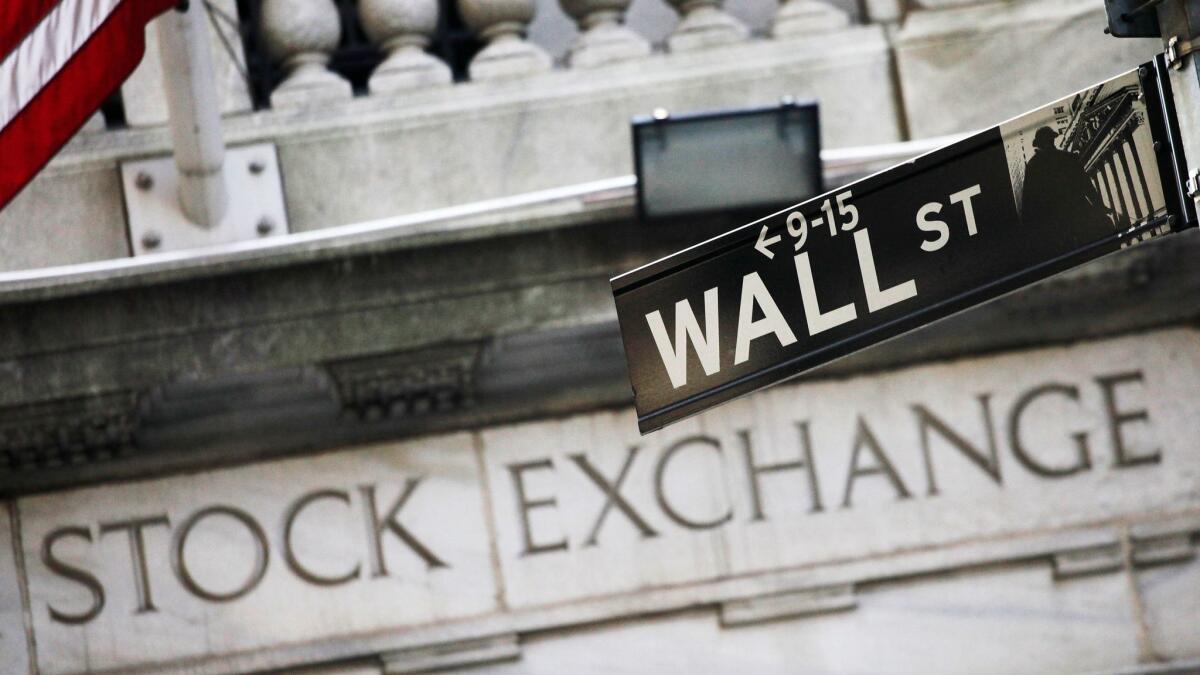Stocks end higher after Trump orders tariffs that are less harsh than feared

- Share via
After hours of indecisive trading, stocks finished with modest gains Thursday after President Trump formally ordered tariffs on steel and aluminum imports with terms that were less harsh than investors had feared.
Stocks rallied after reports that Canada and Mexico will be exempted indefinitely from the tariffs and that other countries will be invited to negotiate for exemptions as well.
Congressional Republicans and business leaders oppose the tariffs and have pushed for the Trump administration to take a more measured approach that would invite less backlash from other countries.
“The president’s tone was far more pragmatic,” said Quincy Krosby, chief market strategist at Prudential Financial. “This certainly is not the strict tariff proposal that the president had suggested in the past couple of weeks.”
Healthcare companies rose after pharmacy benefits manager Express Scripts accepted a $52-billion offer from health insurer Cigna. Technology companies also moved up. Energy companies slipped along with oil prices.
The Standard & Poor’s 500 index rose 12.17 points, or 0.5%, to 2,738.97. The Dow Jones industrial average rose 93.85 points, or 0.4%, to 24,895.21. The Nasdaq composite rose for the fifth day in a row, advancing 31.30 points, or 0.4%, to 7,427.95.
The Russell 2000 index of smaller-company stocks slipped 2.57 points, or 0.2%, to 1,571.97. The index had jumped 4.5% over the previous four days as discussion about the proposed tariffs prompted investors to buy U.S.-focused companies and sell multinational firms.
Friday could be another dramatic day on Wall Street as investors review the government’s February jobs report. Stocks tumbled after the January report showed unexpectedly strong growth in wages, which set off worries about inflation.
Cigna will spend about $52 billion to acquire the nation’s biggest pharmacy benefit manager, Express Scripts, the latest in a string of proposed deals as healthcare’s bill payers attempt to get a grip on rising costs. Express Scripts shares jumped 8.6% to $79.72 while Cigna dropped 11.5% to $172.
Kroger fell 12.4% to $22.98 after the grocer posted a bigger fourth-quarter profit and said its digital sales almost doubled in the last year but issued a profit forecast for the current year that disappointed investors. Kroger expects to earn $1.95 to $2.15 a share for the year; FactSet says analysts expected a profit of $2.15 a share on average.
Tronc plunged 24.1% to $15.05 after the newspaper publisher’s quarterly profit fell far short of Wall Street’s forecasts. The company’s papers include the Los Angeles Times, which it is in the process of selling.
Tech Data Corp. sank 19.7% to $86.40 after the distributor of information technology products gave a weak revenue forecast.
FTD dived 32.6% to $4.55 after the flower and gift delivery company said Valentine’s Day sales were about $20 million less than it expected.
Wynn Resorts rose 6.4% to $179.11: A month after CEO Steve Wynn stepped down, the casino operator raised its dividend and said its business is doing well.
Benchmark U.S. crude fell $1.03, or 1.7%, to $60.12 a barrel in New York. Brent crude, used to price international oils, fell 73 cents, or 1.1%, to $63.61 a barrel in London. That led to more losses for energy companies.
Investors expect February’s jobs report will show another month of strong hiring. According to FactSet, they expect to see that hourly wages grew 2.8%. That’s similar to last month’s report, which caught investors by surprise. Wall Street feared that the stronger wage gains mean inflation is picking up and that interest rates will start to rise more rapidly, slowing the economy.
That helped touch off a nine-day, 10% plunge for the S&P 500, which has yet to fully recover.
Friday is the ninth anniversary of the current bull market. March 9, 2009, was the lowest point for the S&P 500 after the 2008-09 financial crisis that touched off the Great Recession. The index has roughly quadrupled since then, and it’s about five months away from becoming the longest bull market since World War II.
Bond prices edged up. The yield on the 10-year Treasury note fell to 2.85% from 2.88%. Bank stocks fell, because lower yields mean banks can’t make as much money from lending.
Wholesale gasoline fell 4 cents to $1.87 a gallon. Heating oil fell 2 cents to $1.86 a gallon. Natural gas fell 2 cents to $2.76 per 1,000 cubic feet.
Gold fell $5.90 to $1,321.70 an ounce. Silver rose 1 cent to $16.50 an ounce. Copper fell 6 cents to $3.08 a pound.
The dollar inched up to 106.24 yen from 106.07 yen. The euro fell to $1.2306 from $1.2403.
The CAC 40 in France advanced 1.3%. The DAX in Germany rose 0.9%. In Britain the FTSE 100 gained 0.6%. That came after the European Central Bank hinted that it is closer to exiting its extraordinary monetary stimulus effort.
The Hang Seng in Hong Kong jumped 1.5%. Japan’s Nikkei 225 index edged up 0.1%. The South Korean Kospi gained 1.3%.
UPDATES:
3:05 p.m.: This article was updated with closing prices, context and analyst comment.
This article was originally published at 7:30 a.m.
More to Read
Inside the business of entertainment
The Wide Shot brings you news, analysis and insights on everything from streaming wars to production — and what it all means for the future.
You may occasionally receive promotional content from the Los Angeles Times.










